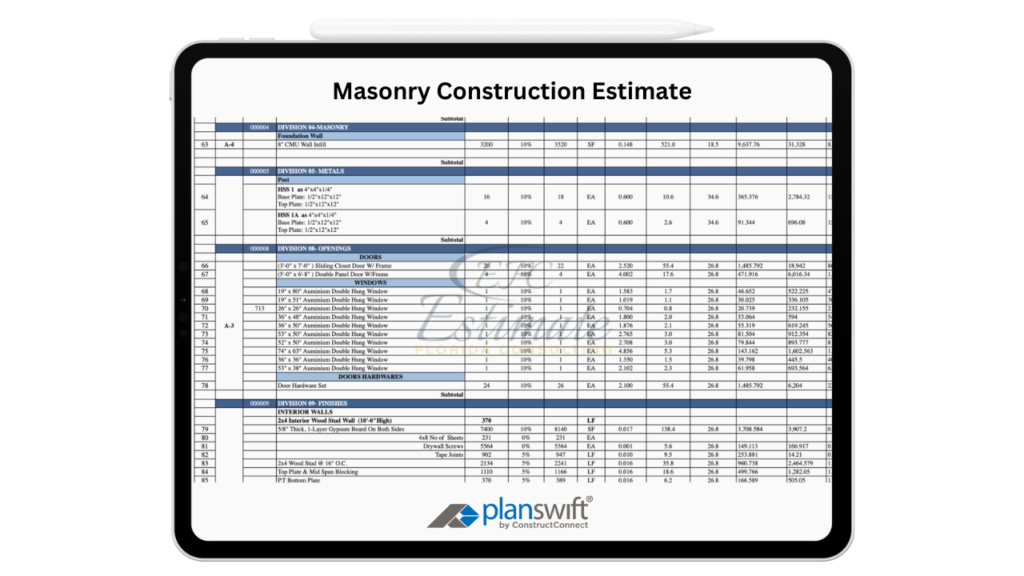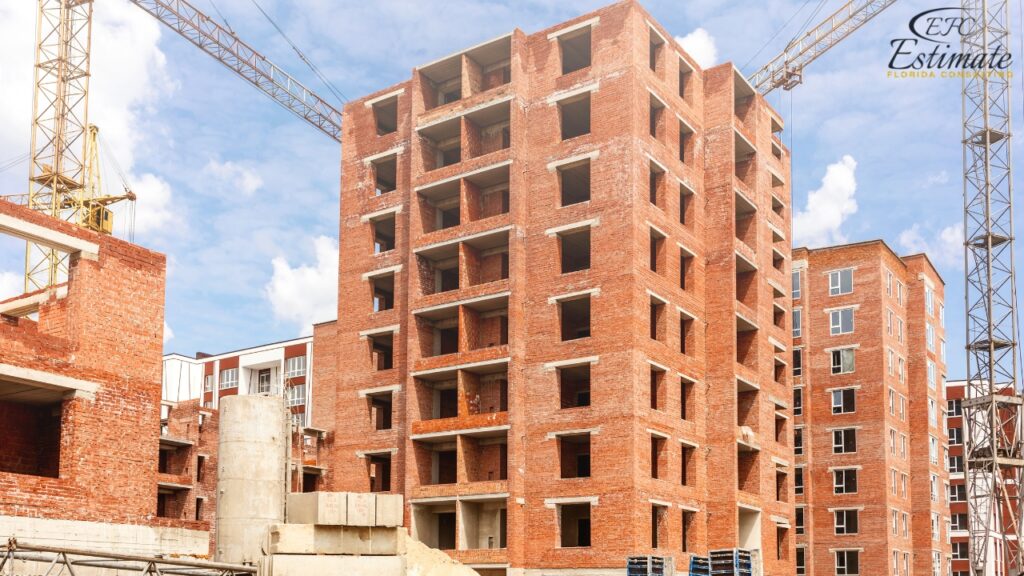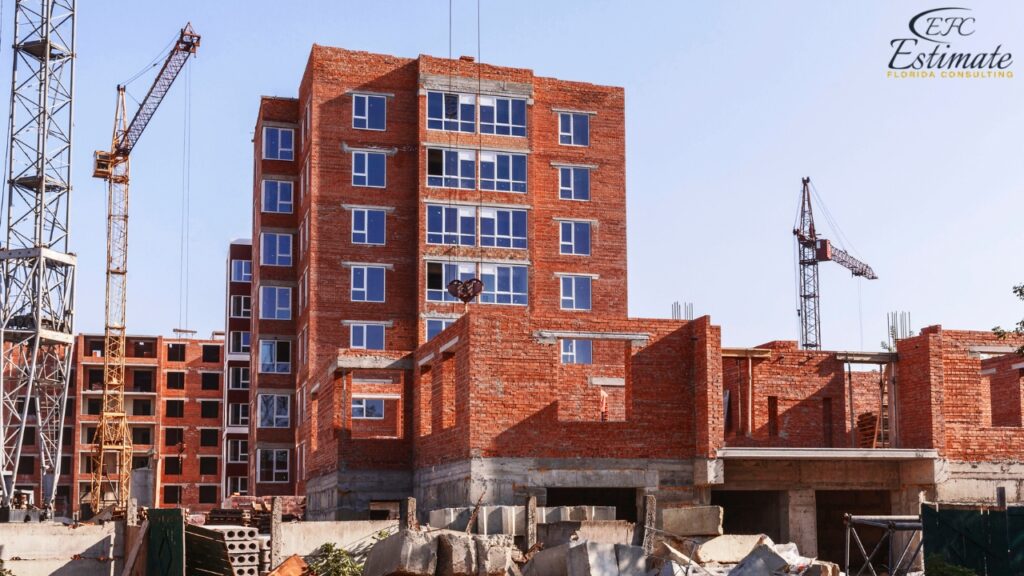90% More Chances to Win Projects With Our Estimate!
- Multi-Family Building
- Hotel Building
- Hospital Building
- Warehouse Building
- School & University Building
- High-Rise Building
- Shopping Complex
- Data Center Building

Brick masonry is an ancient yet versatile construction method that is still widely used today for its durability, aesthetic appeal, and structural capabilities. Whether you are a general contractor, subcontractor, material supplier, developer, or homeowner, understanding the cost dynamics of brick masonry is critical to planning and executing projects efficiently. This guide will explore the various components of brick masonry construction, including material costs, labor requirements, and additional construction factors such as roofing, flooring, drywall, mechanical systems, plumbing, and electrical components.

Brick masonry costs vary based on several factors, such as the type of brick used, the complexity of the design, labor rates, and additional materials like reinforcements and mortar. Projects located in regions like Florida, where extreme weather conditions necessitate the use of moisture-resistant materials, may also see cost fluctuations due to local material demand and labor rates.
The average cost for brick masonry ranges between $10.89 to $36.30 per square foot, but this range can widen depending on the specific type of masonry (solid, veneer, or reinforced). Additionally, the project’s location and the level of craftsmanship involved can impact both material and labor costs. Contractors need to account for these variables when estimating the total budget for brick masonry projects.
Brick masonry can take many forms, each suitable for different applications, whether structural or decorative. Here’s a detailed look at common types of brick masonry and their associated costs.
Solid brick masonry involves constructing full, load-bearing walls using complete bricks without any gaps. This technique is popular for its robustness and ability to offer excellent thermal insulation and fire resistance. It is most commonly used in load-bearing walls, exterior facades, and multi-story buildings, where strength and stability are essential.
Brick Type | Material Cost (per sq. ft.) | Labor Cost (per sq. ft.) | Total Cost (per sq. ft.) |
Solid Brick Masonry | $10.89 – $19.80 | $5.32 – $13.31 | $16.21 – $33.11 |
The cost of solid brick masonry is higher due to the volume of materials used and the labor intensity involved. Masons typically spend more time on solid brick construction due to the precision required in ensuring structural integrity and alignment. For projects like office buildings or high-end homes, solid brick masonry is a premium option that adds both beauty and functionality.
Veneer brick masonry, on the other hand, is less expensive because it only involves attaching a thin layer of brick to a supportive backing structure made of metal or wood. This technique is commonly used to achieve the appearance of brick without the associated high costs or weight. Veneer masonry is mostly aesthetic and does not provide structural support.
Brick Type | Material Cost (per sq. ft.) | Labor Cost (per sq. ft.) | Total Cost (per sq. ft.) |
Veneer Brick Masonry | $7.26 – $15.97 | $3.99 – $10.65 | $11.25 – $26.62 |
While veneer brick is more cost-effective, it is essential to properly install the backing structure and ensure the bricks are properly attached to avoid long-term issues, especially in high-humidity areas. The labor involved in attaching the veneer is also less intensive, making it a quicker option for residential or smaller commercial buildings.
Reinforced brick masonry incorporates steel reinforcements like rebar or wire mesh to provide additional strength, particularly in load-bearing walls or structures subject to seismic forces. This type of masonry is ideal for multi-story buildings, commercial projects, and areas where structural stability is crucial.
Brick Type | Material Cost (per sq. ft.) | Labor Cost (per sq. ft.) | Total Cost (per sq. ft.) |
Reinforced Brick Masonry | $12.71 – $23.96 | $6.66 – $15.73 | $19.37 – $39.69 |
Due to the need for reinforced steel, this form of brick masonry is more expensive than standard or veneer brick masonry. The installation of reinforcement bars and additional concrete support adds to both material and labor costs, but this method is essential for ensuring structural safety in earthquake-prone regions or for taller buildings.
Beyond bricks, several other materials are integral to the successful completion of a brick masonry project. The quality of these materials directly affects the durability and overall cost of the project.
Different types of bricks are used depending on the project’s specific needs. These include standard red bricks, face bricks for aesthetic finishes, and fire-resistant bricks used in high-temperature environments.
Brick Type | Cost (per 1,000 bricks) |
Standard Red Brick | $484 – $798 |
Face Brick | $798 – $1,597 |
Fire Brick | $1,064 – $1,997 |
The choice of brick type impacts both material costs and the long-term maintenance of the structure. Face bricks are typically used for exterior facades in high-end residential and commercial buildings, offering a more visually appealing finish at a higher price point. On the other hand, fire bricks are designed for industrial use or fireplaces, where durability under high temperatures is essential.
Mortar is the glue that holds bricks together, and its quality determines the longevity of the masonry. There are various types of mortar, with stronger mixes used for load-bearing walls or reinforced brickwork.
Material | Cost (per bag) |
Standard Mortar | $7.99 – $13.31 |
High-Strength Mortar | $13.31 – $19.97 |
Cement for Foundation Work | $10.65 – $15.97 |

Standard mortar is sufficient for veneer or decorative brickwork, while high-strength mortar is necessary for structural projects like retaining walls or reinforced masonry. Cement is another essential material, especially in foundational work, where strength and durability are critical.
In reinforced brick masonry, steel reinforcements like rebar and mesh are inserted to provide additional structural strength, especially in taller buildings or earthquake-prone areas.
Reinforcement Type | Cost (per linear foot) |
Steel Rebar (No. 3) | $0.80 – $1.33 |
Steel Mesh | $0.67 – $1.60 |
Reinforcements are crucial for the longevity and safety of the building. In regions that experience high winds, seismic activity, or heavy loads, reinforced masonry can prevent wall failure and increase the building’s lifespan.
Labor plays a significant role in the cost of brick masonry. The cost of hiring skilled masons and general laborers can vary based on project complexity, location, and labor availability. The more intricate the design and the higher the structural demands, the higher the labor costs.
Task | Labor Cost (per hour) |
Bricklaying | $53.24 – $99.83 |
Mortar Application | $39.93 – $72.60 |
Reinforcement Installation | $66.55 – $106.48 |
Skilled masons are essential for creating structurally sound and visually appealing brickwork. Poor workmanship can lead to cracks, misalignment, and other issues that may compromise the building’s integrity. Therefore, hiring experienced professionals can increase upfront costs but also reduce long-term repairs and maintenance.

Aside from brick and mortar, other construction elements significantly contribute to the overall cost of a brick masonry project. Here’s a look at key aspects like roofing, flooring, and mechanical systems that contractors should consider.
Roofing materials impact both the durability and aesthetics of the building. Brick masonry structures often pair well with heavier, more durable roofing materials like clay tiles or metal roofs.
Roofing Type | Cost (per sq. ft.) |
Asphalt Shingles | $5.97 – $9.33 |
Metal Roofing | $9.97 – $13.31 |
Clay Tiles | $13.31 – $26.65 |
While asphalt shingles are more affordable, metal and clay tile roofs offer greater durability and longer life spans, making them ideal for commercial buildings and high-end homes.
For brick masonry buildings, durable flooring options like natural stone or ceramic tiles are often chosen to complement the robust brick structure.
Flooring Type | Cost (per sq. ft.) |
Ceramic Tiles | $4.66 – $9.33 |
Natural Stone | $13.31 – $26.62 |
Hardwood Flooring | $9.97 – $19.98 |
Choosing the right flooring type is essential for both functionality and aesthetic appeal. Ceramic tiles are popular due to their durability, water resistance, and ease of maintenance, making them suitable for high-traffic areas. Natural stone adds a touch of luxury and can improve the building’s overall resale value, while hardwood flooring offers warmth and comfort, although it requires more maintenance.
In addition to the primary components discussed, various other elements significantly affect the overall cost of a brick masonry project. Here are detailed cost tables for essential construction aspects, including drywall, mechanical systems, electrical work, and plumbing.
Drywall is critical in completing interior spaces, providing a smooth surface for finishing and painting. The type of drywall chosen can impact both cost and performance.
Drywall Type | Material Cost (per sq. ft.) | Labor Cost (per sq. ft.) | Total Cost (per sq. ft.) |
Standard Drywall | $0.75 – $1.33 | $1.00 – $2.00 | $1.75 – $3.33 |
Fire-Resistant Drywall | $1.33 – $2.66 | $1.33 – $2.66 | $2.66 – $5.32 |
Moisture-Resistant Drywall | $1.00 – $2.00 | $1.00 – $2.00 | $2.00 – $4.00 |
Standard drywall is commonly used for most interior applications, while fire-resistant drywall is essential in areas requiring enhanced safety, such as stairwells or between unit separations in multi-family buildings. Moisture-resistant drywall is ideal for kitchens and bathrooms, helping to prevent mold and mildew.
Drywall is critical in completing interior spaces, providing a smooth surface for finishing and painting. The type of drywall chosen can impact both cost and performance.
Drywall Type | Material Cost (per sq. ft.) | Labor Cost (per sq. ft.) | Total Cost (per sq. ft.) |
Standard Drywall | $0.75 – $1.33 | $1.00 – $2.00 | $1.75 – $3.33 |
Fire-Resistant Drywall | $1.33 – $2.66 | $1.33 – $2.66 | $2.66 – $5.32 |
Moisture-Resistant Drywall | $1.00 – $2.00 | $1.00 – $2.00 | $2.00 – $4.00 |
Standard drywall is commonly used for most interior applications, while fire-resistant drywall is essential in areas requiring enhanced safety, such as stairwells or between unit separations in multi-family buildings. Moisture-resistant drywall is ideal for kitchens and bathrooms, helping to prevent mold and mildew.
Mechanical systems, particularly HVAC (Heating, Ventilation, and Air Conditioning), are crucial for maintaining a comfortable environment within brick masonry buildings. Understanding these costs helps in estimating the overall project budget.
System Type | Cost (per sq. ft.) |
HVAC Installation | $5.32 – $9.97 |
HVAC Maintenance | $1.33 – $3.99 |
Ductwork Installation | $4.66 – $8.99 |
The installation of an HVAC system involves selecting the appropriate units based on building size and layout. While initial costs can be significant, a well-installed HVAC system can lead to lower long-term energy costs.
Electrical work is a critical aspect of brick masonry construction, encompassing everything from wiring and lighting fixtures to service panels and outlets.
Electrical Component | Cost (per unit) |
Basic Wiring | $1.32 – $2.66 per linear foot |
Outlets | $6.66 – $13.32 each |
Light Fixtures | $39.93 – $199.98 each |
Circuit Breaker Panel | $199.98 – $399.98 each |
Electrical systems must be designed according to local building codes, and ensuring proper installation can prevent costly future repairs or safety hazards.
Plumbing systems are vital for any building, ensuring the delivery of clean water and the safe disposal of wastewater. Here’s a look at the costs associated with various plumbing components.
Plumbing Component | Cost (per unit) |
Basic Plumbing Fixtures | $39.93 – $99.99 each |
Piping (PVC or Copper) | $0.67 – $2.00 per linear foot |
Water Heater | $499.98 – $1,299.98 each |
Proper planning and installation of plumbing systems are crucial for minimizing leaks, ensuring efficiency, and maintaining water quality. Using high-quality materials can also reduce long-term maintenance costs.

Optimizing the costs of brick masonry requires a careful balance of material quality, labor efficiency, and smart sourcing of materials. Using cost-effective yet durable materials, choosing the appropriate type of brick masonry for your project, and hiring skilled masons can significantly impact the overall budget.
Understanding the detailed cost breakdown of each component allows general contractors, subcontractors, developers, and homeowners to make well-informed decisions that enhance the efficiency and success of their construction projects.
The cost of brick masonry is influenced by several factors, including the type of bricks used, the complexity of the design, labor rates, and the need for additional materials like mortar and reinforcements. Location also plays a role, as regional demand for materials and skilled labor can affect pricing.
On average, brick masonry costs between $10.89 and $36.30 per square foot. The exact price varies based on the type of masonry, location, and craftsmanship involved. Solid brick masonry tends to be more expensive than veneer or reinforced masonry due to the materials and labor intensity required.
There are several types of brick masonry:
Besides bricks, consider costs for:
Labor costs can significantly impact the total expense of brick masonry projects. Skilled masons can charge between $53.24 and $99.83 per hour for bricklaying, and hiring experienced professionals can help ensure quality workmanship, which may save on long-term repair costs.
Yes, beyond the visible costs of bricks and labor, consider potential hidden costs such as:
To estimate the total cost, consider all components: the type of brick, labor, additional materials (mortar, cement, reinforcements), and other construction elements like roofing and flooring. Use the provided cost ranges to calculate based on your project's specific needs and scope.
Brick masonry provides durability, aesthetic appeal, and energy efficiency. It can withstand harsh weather conditions and offers excellent thermal insulation, making it suitable for both residential and commercial applications.
Yes, while initial costs can be higher compared to other materials, brick masonry's long lifespan, low maintenance needs, and energy efficiency often lead to lower overall costs in the long run, making it a worthwhile investment.
At Estimate Florida Consulting, we offer detailed cost estimates across all major trades, ensuring no part of your project is overlooked. From the foundation to the finishing touches, our trade-specific estimates provide you with a complete and accurate breakdown of costs for any type of construction project.

We take pride in delivering accurate, timely, and reliable estimates that help contractors and builders win more projects. Our clients consistently praise our attention to detail, fast turnaround times, and the positive impact our estimates have on their businesses.
Estimate Florida Consulting has helped us win more bids with their fast and accurate estimates. We trust them for every project!

Submit your project plans, blueprints, or relevant documents through our online form or via email.
We’ll review your project details and send you a quote based on your scope and requirements.
Confirm the details and finalize any adjustments to ensure the estimate meets your project needs.
Receive your detailed, trade-specific estimate within 1-2 business days, ready for your project execution.

561-530-2845
info@estimatorflorida.com
Address
5245 Wiles Rd Apt 3-102 St. Pete Beach, FL 33073 United States
561-530-2845
info@estimatorflorida.com
Address
5245 Wiles Rd Apt 3-102 St. Pete Beach, FL 33073 United States
All copyright © Reserved | Designed By V Marketing Media | Disclaimer